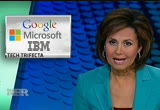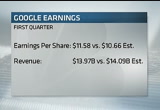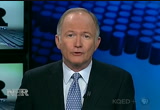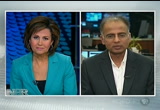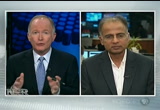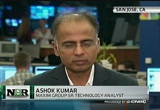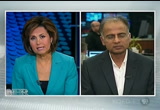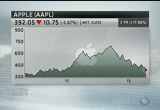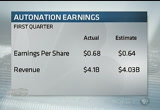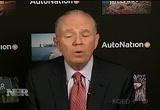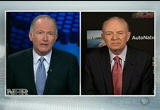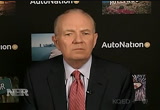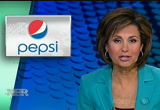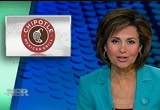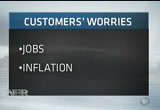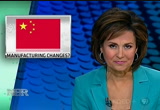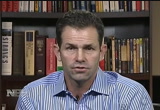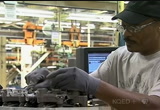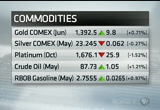tv Nightly Business Report PBS April 18, 2013 6:30pm-7:00pm PDT
6:30 pm
this is "nightly business report" with tyler mathisen and suzy geling. brought to you by -- >> thestreet.com. multimedia tools for an ever-changing financial world. our dividend stock adviser guides and helps generate income during a period of low interest rates. real money helps you think through ideas for investing and trading stocks. action alerts plus is a charitable trust portfolio that provides trade-by-trade strategies. online, mobile, social media. we are thestreet.com. >> tech trifecta. a big night for technology as google, microsoft and ibm report earnings. we'll look at the winners and the losers. stocks slide again. mixed earnings and a batch of economic numbers that missed
6:31 pm
projections drag down the major indexes. >> china's chief labor -- well, at least that was the case -- but as costs rise, are some u.s. manufacturers thinking about pulling out? all that and more tonight on the "nightly business report" for this thursday, april the 18th. good evening, everybody, and welcome. i'm bill griffeth in this week for tyler mathisen. suzy, it's clear that technology is going to set the tone for tomorrow, don't you think? >> three big tech names in the news tonight, google, microsoft and ibm. three huge technology companies all reporting latest quarterly earnings after the bell tonight with mixed results. the results are important given new concerns about slowing global economic growth. and a sharp decline in the sales of personal computers this year. the report set up a flurry of activity in after-hours trading as the direction of all three companies will impact countless other tech suppliers and component makers on friday. and since ibm is the most heavily weighted stock in the dow, investors will keep close
6:32 pm
watch on big blue shares tomorrow. microsoft was the first of the big three to report this evening, and that's where we begin with seema mody at the nasdaq. seema? >> suzy, a big day for tech. microsoft first. a lot of concern around weakness and personal computer sales ahead of its earning report, but the numbers are out, and it beat the street by 4 cents on its bottom line. ceo steve baumer said the bold bets we made on cloud services are paying off. they also announced f.o. peter klein will be leaving the company at the end of the year. it will name its new cfo in the next several weeks. let's also look at google. shares are up after hours. the internet giant reporting an eps of $11.58 versus a street estimate of $10.66. however, its quarterly revenue of $13.97 billion came in slightly shy of the $14.09 billion expected by the street. and lastly, big blue ibm, the
6:33 pm
diversified tech player that is many times seen as a good barometer of what to expect from the broader technology space missed street expectations on its top and bottom line due to a decline in hardware and services sales. its first quarter eps came in at $3 a share versus a $3.05 estimate. the investment group says looking back over the last ten years, ibm's one-day reaction to earnings has accurately predicted the direction of the s&p 500 over the following five weeks. more than 75% of the time. and if that's the case, then tomorrow might be a down day. we are seeing ibm shares down after hours. bill and suzy, back to you. >> seema, thank you very much. joining us right now to talk about technology and where he thinks it's headed is chuck kamarez, senior technology expert at maxim group. welcome back. >> thank you. >> all three that reported tonight missed on the top line. they were light on revenue. does that worry you?
6:34 pm
>> no, i think these are cyclical trends. the technology companies are faced with the macroeconomic climate which is weak across the developed markets. and they're continuing to slow down including pcs and smartphones. and the service side of the business i think we are seeing hesitancy among the large corporate accounts. so it's more cyclical in nature than secular. >> you know, this has been a tough time for technology companies, technology earnings. and there are so many changes happening in the technology space. and you see a company like apple once, you know, the darling of the tech sector. now it's, you know, kind of a broken company, so to speak. what is it, shook, that defines what makes a winner in the technology space versus an also ran? >> absolutely. going back to the apple story, i think the company's meteoric stock rise from its mid-peak to $700 i think reflected
6:35 pm
disruptive in cycle both in terms of price and unit so the company came in and dominated the tablet market, came in and was creator of significant value in the smartphone segment. and i think the company has been able to right that cycle, but now, of course, it's on the other side of that mountain, so to speak. so over $200 billion of market cap has been removed. and so the company is looking forward, our best position, as you pointed out, in this undergoing transformation of the technology value chain, our position at the nexus or the intersection of -- in a consumer or cloud, the information, the mobility and social media, so we think the three companies that should benefit longer term are google, amazon and three, ibm. >> we keep hearing the migration to mobile. we all have tablets. we all have smartphones. what about the pc? are we looking at the sunset years for the personal computer right now? >> i think it's become primarily
6:36 pm
a replacement in a market. in other words, the life cycle of the pc continues to get extended because of the lack of compelling applications that are being written for the pc platform. so the go-to platform or the post-pc devices as steve jobs put it, the smartphones and the tablets, and that's where the application developer community is focused on. >> you see a wide range of technology companies. let me just get back to, you know, which are the ones, the companies that you think have the platforms that are on the cutting edge. and maybe not any of the companies that we've been talking about tonight that reported earnings. >> absolutely. that's a very good point because it seems that investors at the margin are focusing and voting with the dollars and disrupters, and these could be companies like sales force, it could be a company like work day, it could be companies like networks and moving away from legacy companies like dell, hewlett-packard, emc and to a lesser degree oracle.
6:37 pm
>> and what about an ibm? so influential for years. they've made this transition through the services industry. they were cutting emg dge on th. what did you think of their earnings, and where do you think they're going from here? >> bill, you raise a lot of key points on ibm. i think they were early to recognize industry transition away from hardware to software and services in the '90s. so the company's portfolio, if you look at it in a longer-term sector, it's cyclical, so they're able to write the software and services, they're in a position to grow, you know, the top and bottom line, high single digits over longer term. so i think yes, there are some cyclical issues buffeting the near-term performance. but from a longer-term perspective, they're very well positioned to address their customer needs. >> this has been a big week for technology earnings. a lot of people are wondering what impact this is going to have on trading tomorrow. do you think that this latest batch is going to influence stocks to the positive or the negative either way? >> no, i think from a training perspective, which is very
6:38 pm
near-term oriented, yes. but longer term, i think technology sector creates a tremendous amount of value across key markets and segments. i think these are cyclical factors that are impacting performance. but longer term, value proposition in terms of risk return is very compelling on these key technology leaders in the sector. >> shook from the maxim group, good to see you. thank you for joining us. >> thank you. on wall street today, another day of selling and volatile trading, a round of disappointing economic reports and earnings sent the major averages lower. the biggest decliner in the dow, united health care, falling nearly 4% more. we'll have more on that in our market focus. and the nasdaq was hit by apple that we were just talking about, closing before $400 a share for the first time since december of 2011. looking at the closing numbers, the dow down 81 points. the nasdaq lost 38 and the s&p 500 off ten points. also weighing on the markets,
6:39 pm
first-time jobless claims rose by 44,000 last week. the philadelphia federal reserve bank said business activity in the mid-atlantic region slowed down this month. and the read on leading economic indicators unexpectedly declined in march. falling for the first time in four months. but there has been no slowdown in auto sales so far this year. and with sales of cars and pickups revving higher, auto nation reported a record-breaking quarter before the bell. the country's largest auto dealership owner reported that first quarter profits rose by 14% on a best-ever 68 cents a share with revenues that topped $4 billion. sales of new and used cars were higher last quarter, getting help from the recovery in housing and the chain even announced plans to expand. auto nation ceo michael jackson joins us now. mike, nice to see you again. i want to ask you, why is this business so good, and is it safe
6:40 pm
to say now that the car business is getting back to normal? >> well, suzy, you have to look at it within the context in the auto industry. we had a depression, a complete crash, a complete breakdown in '08, '09, '10. we could not get financing for our customers. so business practically came to a standstill. and so what happened is, it pushed out the average age of cars in america to 11 years old. it's unprecedented. and people really need to do something at this point. the trades we're looking at have 150,000 miles on it. so people stop buying cars, stop repairing cars for several years, and now there's genuine replacement need. so they come in to talk to us, and we have the best product offering ever. outstanding quality. and by quality, i mean fit, finish, design, innovation, content. and dramatically improved fuel economy.
6:41 pm
we don't ask customers to downsize or go slower, and you don't have to buy exotic hybrids or electric. mainstream technology will give you a 25% to 30% improvement in fuel economy. and finally, we have the best financing ever because ironically during the downturn that customers continued to pay for the cars. we were the first payment-to-household made. so the banks have really moved back into financing cars. so you put it all together, you really have a lot of structural support for this one bright spot in the u.s. economy, the automotive recovery. >> it's clear to see why you're a superstar salesman, mike. one of the trends we've seen in the recovery has been the tremendous strength of the rental -- not the rental -- of the used car market. is that still the case? are people tending to buy more used cars than they did in the past? >> well, the used car story is the following. we are selling big improvements in used cars and new cars. and because there's such a shortage of used cars because
6:42 pm
production came -- was so dramatically low from '08, '09 during the depression, there is a shortage which means the value of the trades are at record highs. so people, had they come in, not only do we have all those other drivers that are already called out, but then we say listen, we can give you more money for your trade than you're ever going to get. and they say great, i'm ready to get something newer, whether it's still used or new. >> let me ask you this, mike. i know you hear this all the time. everybody's talking about the pros and cons of 0% interest rates and talking about at some point they're going to go up. when interest rates do go up, will consumers be less likely to be more interested in buying a car and to finance it? >> no, i think these record low interest rates, everybody knows that it will not continue. i should be clear, the market rate that customers are paying today, let's say around 3.5%,
6:43 pm
4%, if you talk 0%, that is an incentive that has been bought down by a manufacturer. so it's 3.5%, 4%, but customers are used to paying 5%, 6%, 7% on the financing of an automobile. so i don't think the normalization of interest rates to those levels is going to unseat these drivers that i've called out that are driving this recovery. we're in the early innings of this automotive recovery. we're on a journey back to the industry, selling 16, 17 million units a year. >> that's nice to end on an upbeat note. thank you, mike. so good to see you. mike jackson, ceo of auto nation. and sticking with the theme of retail a little later in the program, we'll look at why walmart is one earnings report to watch when that sector reports. meantime, united health care beat earnings estimates. it wasn't all positive. the company also said first quarter profits dropped because
6:44 pm
of lower government payments for its medicare services. the company warned that the sequester would pressure profits the rest of this year, and it did not issue specific guidance for 2014. united health care was off almost 4% to $59 and change followed by other insurers like humana, etna and wellpoint, all down at least 2% at the close. dow blue chip verizon reported increased profits thanks to its booming wireless business and lower costs. verizon activated 4 million iphones during the quarter. shares hit a new all-time high today before dropping back to close at $50.91, up almost 3%. pepsico also touched a new all-time high today as soft drink price increases helped boost profit margins. revenues in its snack business improved well particularly in china. pepsi gained more than 3%. morgan stanley is the last wall street bank to report, came in above estimates, helped by a
6:45 pm
boost in stock trading volume. but investors did focus on weakness in the company's bond trading unit. morgan stanley shares lost more than 5% on the day. and after the close, vertex pharmaceuticals reported significant progress in test patients with cystic fibrosis. vertex's improved drug therapy improved patients' lung function in a phase 2 study. now, shares had closed down at the end of the session. but after the report came out, they were up as much as 50% in after-hours trade. and chipotle reported a blowout 22% increase in profits, and that's thanks to stronger sales. and said it expects to open as many as 180 new locations this year. the company restated its guidance of flat to low single-digit same-store growth for the rest of the year. shares of chipotle which were down more than 3% at the close gained as much as 7% in after-hours trading. and coming up, moving operations to china was a
6:46 pm
6:47 pm
more money shopping than at walmart. as we continue our "earnings spotlight," courtney reagan tells us how important walmart's results are to investors and what they might reveal about consumers and other big retailers. >> reporter: while the bulk of retailers report earnings towards the end of the season, the results are closely monitored by investors trying to take the pulse of the consumer amid continued uncertainty. and for decades running, it's the earnings released from the world's largest retailer that is perhaps the most anticipated. >> walmart is the bellwether. and other than the time period where walmart was doing project impact a few years ago, it has always been the bellwether. >> reporter: a bellwether for good reason. every week more than 200 million consumers shop in the nearly 10,800 walmart retail locations around the world. for the first quarter, walmart is expected to report revenue of more than $116 billion. with earnings of $1.15 per share.
6:48 pm
walmart's u.s. same-store sales is a key metric investors watch. it measures the amount sales increased or decreased for stores open at least a year. while the retailer has posted a gain in each of the last five quarters, the growth rate shows a downward trend. walmart competitor target is warning investors that its earnings will miss expectations. saying the lingering cold weather in much of the country has hurt sales of seasonal and weather-sensitive items. investors are now wondering if walmart's sales have been equally impacted. but beyond the financials, investors glean insight from walmart's consumer research. every quarter the company surveys its shoppers to take the pulse of what's concerning them most. last quarter walmart u.s. ceo bill simon says his consumers were most worried about jobs followed by inflation, taxes and gas prices. consumers may have concerns, but a number of analysts aren't worried. >> i think walmart right now is running as well as walmart has
6:49 pm
ever run since i started watching them in 1968. they are doing a fabulous job of bringing product at the price to the customer. >> reporter: and the stockholders are reaping the benefits. walmart sharesgained 27% over the last year, better than the s&p index and the broader s&p 500 over the same time period. for "nightly business report," i'm courtney reagan. and tomorrow we turn our attention to housing and the one company to watch this earnings season. so many american companies including many walmart suppliers move manufacturing out of the u.s. to plants in china, looking to save money. but things have changed. rising costs for labor, material and shipping has forced a lot of companies to consider bringing some of those jobs back home. phil lebeau has more from shanghai. >> reporter: here in shanghai, u.s. manufacturers who have set up plants here in china are facing a new challenge, rising costs. in fact, a new study out today
6:50 pm
finds that the total cost of manufacturing in china will rise to the same level as the u.s. by 2015. for prince industries based in illinois, costs for its plant here in shanghai are rising faster than expected. for example, labor wages are jumping 12% every year due to the competition to attract and retain skilled workers. they've got 110 employees here in china, making components companies sell to firms like caterpillar and honeywell. and the ceo says those rising costs may force him to eventually move out of shanghai. >> we're looking at different areas in china. shanghai has been high cost to manufacture, but that was where we initially went to, and all of our customers were in that area, but in the next five to seven years, i would say we'll definitely be somewhere further inland. >> reporter: take a look at how fast hourly wages have climbed here in china compared to india, mexico and the united states. meanwhile, china's currency, the
6:51 pm
rmb, has appreciated more than 25% over the last ten years. put those together and you see why the overall cost of manufacturing in china has gone up so rapidly in recent years. now analysts believe the cost of manufacturing here in china will be equal to manufacturing in the u.s. within a couple of years. >> if you go back to 2005, it was pretty common for landed costs from china to be 25% to 30% less than the cost of manufacturing in the united states. based on our analysis, that gap -- about two-thirds of that gap has been closed. >> reporter: do rising costs here in china mean more u.s. manufacturers will pull out of this country and bring jobs back to the u.s.? well, don't expect a huge rush of reshoring. there may be a few companies to bring jobs back. what's more likely is they will keep their china plants focused on selling to companies here in china while u.s. plants pick up more of the manufacturing for companies in the u.s.
6:52 pm
one big advantage u.s. manufacturing plants have over those here in china, productivity. now, it's improving here in china, but it's still not to the level where it is in the u.s. and because of that productivity, u.s. manufacturing plants have been able to keep their costs in check relative to firms here in china. phil lebeau, "nightly business report," shanghai, china. and tomorrow we'll look at whether china, the world's largest auto market, is about to become the world's most lucrative market for luxury carmakers. meantime, still ahead, seaworld is set to make its trading debut tomorrow, but should investors dive in? first, a look, though, at how commodities, treasuries and currencies fared today.
6:53 pm
you can call it a whale of a deal. seaworld entertainment, this is the amusement park behind shamu, the killer whale, will sell shares to the public for the first time ever tomorrow at the new york stock exchange. it's offering 26 million shares, and they price tonight at $27 each. raising $702 million. jane wells takes a closer look at the company. >> reporter: seaworld is hoping its stock market debut will make a big splash. the company made up of 11 theme parks including busch gardens and aquatica wants to raise hundreds of millions of dollars to pay down debt and grow its
6:54 pm
business. >> i want to see sharks and stingrays. >> can't see that stuff in kansas. >> reporter: seaworld was bought by the blackstone group back in 2009, and the new owners return it had to profitability. the recession put the business on something of a roller coaster, but net income swung from a $45 million loss in 2010 to over $77 million in profits last year. customers are spending more money, and the company is hoping to attract more international travelers, especially to san diego. >> seaworld is one of the major attractions for those international travelers. >> reporter: but there are risks. the company says it has nearly $1.7 billion in debt. and when your entire business model is built around 67,000 animals, there are unique challenges. the company is appealing federal safety violations after an orca killed a trainer in orlando three years ago. seaworld board could also be subject to changing regulations or the loss of licenses to keep animals. but the animals are what make
6:55 pm
seaworld entertainment stand apart from other theme park companies. >> as a kid, i loved shamu so much, so i can't wait for my son to have that in his life as well. >> reporter: investors will decide if seaworld is a whale of a buy or fear it could end up under water. for "nightly business report," jane wells, san diego. and tomorrow we'll be speaking with ceo jim atchison at the new york stock exchange. bill, i understand he's bringing a penguin to help him ring the opening bell tomorrow morning. >> one of the best-dressed bell ringers they've had at the exchange in quite a while. it's a great family story, but can they continue to grow this franchise? it's pretty long in the tooth. >> i'll ask him. we'll find out. i'll report back tomorrow. and that's "nightly business report" for tonight. thanks so much for watching. >> i'm bill griffeth. have a great evening. we will see you again tomorrow. >> "nightly business report" has been brought to you by -- >> thestreet.com.
6:56 pm
interactive financial, multimedia tools for an ever-changing financial world. our dividend stock adviser guides and helps generate income during a period of low interest rates, options profits, helps educate beginning and seasoned options traders. action alerts plus is a charitable trust portfolio that provides trade-by-trade strategies. online, mobile, social media. we are thestreet.com.
131 Views
Uploaded by TV Archive on

 Live Music Archive
Live Music Archive Librivox Free Audio
Librivox Free Audio Metropolitan Museum
Metropolitan Museum Cleveland Museum of Art
Cleveland Museum of Art Internet Arcade
Internet Arcade Console Living Room
Console Living Room Books to Borrow
Books to Borrow Open Library
Open Library TV News
TV News Understanding 9/11
Understanding 9/11

